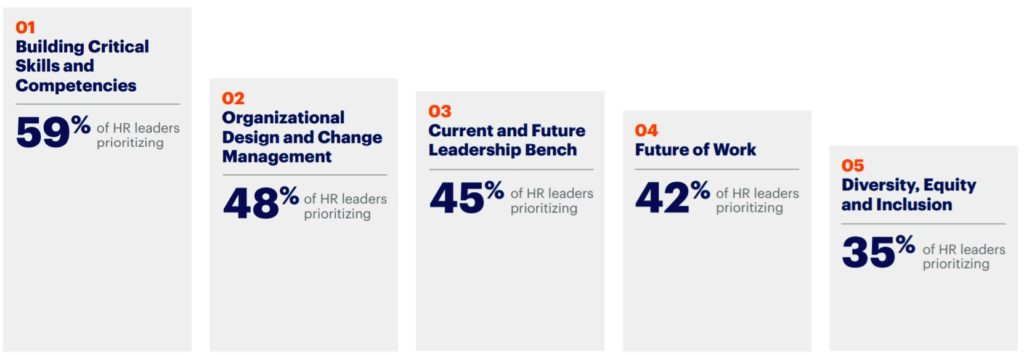A Gartner survey of 550 HR leaders in July 2021 identified Diversity, Equity and Inclusion (DEI) as a priority (35%) for 2022. The analyst also noted that 60% are committed to building critical skills and competencies in the coming year.
Other priorities for the coming year include organizational design and change management (48%), current and future leadership bench (45%), and the future of work (42%).
Figure 1: Top 5 Priorities for HR Leaders in 2022

Source: 2022 Gartner HR Priorities Survey

“The shift to hybrid work, rapidly increasing turnover and heightened war for talent, and rising pressure to make progress on DEI are driving these priorities,” said Mark Whittle, vice president of advisory in the Gartner HR practice.
HR leaders will need to focus on the following initiatives to drive business outcomes next year:
Focus on skills not roles
Among 339 HR leaders responding to the July survey, 47% reported not knowing what skills gaps their current employees have, while 40% said they can't develop skill development solutions fast enough to meet evolving skill needs.

Sunshine Farzan, group head of marketing and communications at Tricor Group, concurred and noted the changing strategy in the selection process.
“Traditionally, companies have defined talent strategy with titles and job descriptions as the foundational ‘unit’ to drive talent management decisions. In today’s hybrid work environment, talent management is evolving from a focus on roles to skills,” she continued.
By emphasizing skills and competencies as well as training to close development gaps, leaders are becoming more agile and sharpening their abilities to identify, train, retain and engage talent. At the same time, employees reap the benefit of continuous upskilling and professional development.
Gartner TalentNeuron data reveals that new skills are replacing old ones – nearly one in three skills that were needed for a job in 2018 will not be needed by 2022 – and that the average number of skills per job is increasing steadily.
“Forward-thinking HR functions are closing development gaps and creating a more adaptable workforce by adopting a skills-centric approach to talent management,” said Whittle.
Creating a positive change experience
Of the 274 HR leaders surveyed by Gartner on their 2022 priorities, 54% reported that their employees are suffering from change fatigue.
Gartner analysis finds that small day-to-day changes – different teammates, a new manager, small process or system shifts – are much more prevalent and 2.5 times more fatiguing to employees than big transformational changes.
“Change fatigue is about more than just the volume of change, it’s also about the exertion and disruption of each experience,” said Whittle.

Peck Yeow Gan, human resources director, AXA Asia, agreed with Whittle adding that: "In times like these, it is indeed key to ensure that we focus on connecting with employees at a deeper level and engage with them in a meaningful way."
To help employees absorb change, HR must establish trust among employees, in their managers, their teammates, and their leaders. Employees with high trust have 2.6 times the capacity to absorb change. Secondly, HR must help build team cohesiveness. Teams that work well together, that listen and care for each other produce employees with almost two times the capacity to absorb change compared to employees who work in low cohesion teams.
Gan said that at AXA Asia and Africa, particular attention is paid to employees' well-being throughout the year. Pulse surveys are conducted globally to get employee feedback.
"During periods when the majority of our global workforce was working from home due to COVID-19, we conducted “checking in” surveys – quick “check-in’s” on employees to find how they have been coping under challenging circumstances and what we, as employers, can do to better support them," she revealed.
Arm managers to lead
To be successful in today’s hybrid environment, where managers have dramatically less visibility into their employees’ day-to-day reality, empathy must be at the forefront.
Managers who lead with empathy develop high levels of trust with their employees, create a culture of transparency and acceptance within their teams, and prioritize people over processes.
They also contextualize performance and behaviour – proactively asking questions and seeking information to better understand the specifics of their direct reports’ contexts.
Gartner analysis shows that managers who display high levels of empathy have three times the impact on their employees’ performance than those who display low levels of empathy.
Shifts in talent needs is coming
Forty-nine per cent of 238 surveyed HR leaders said they do not have an explicit future of work strategy, while one-third reported that their future of work strategy focuses exclusively on hybrid and/or remote work. Yet, the COVID-19 pandemic will have a lasting impact on the future of work far beyond where employees are located.
“HR leaders need to determine which future of work trends have, and will alter, their organization’s strategic plans and what immediate and longer-term workforce adjustments are required as a result,” said Whittle.
After screening the future of work megatrends for relevance, impact and opportunity, HR can partner with other executive leaders to craft a holistic future of work strategy. Leaders should analyse the impact of multiple potential scenarios to identify and prepare for technological, social and labour changes that could significantly shift talent needs.
Nurturing a DEI culture
Among 200 HR leaders surveyed, 36% said they struggle to hold business leaders accountable for DEI outcomes. Gartner says the progression of underrepresented talent stalls in mid-level and senior-level positions as these employees experience slower rates of promotion and worse perception of leadership potential.
Achieving desired DEI outcomes will require HR to adopt a new approach that meaningfully impacts behaviour and outcomes for individual leaders.
This type of consequential accountability – rather than collective accountability – is based on driving equitable talent decisions, enabling leader execution of DEI goals, and requiring progress on DEI goals for any leader to advance in the organization.

Margaret Chen, vice president of human resources for SAP Greater China, acknowledges that as a global company with employees from over 150 nationalities, SAP believes that diversity and inclusion are fundamental to SAP’s success.
She also confirmed that the company is constantly refining mechanisms for better diversity and inclusion outcomes. SAP China was the first company in Asia and the second in the world to achieve the highest level – EDGE Lead certification.
“Our aspiration is that SAP’s workforce mirrors the diversity in a society that includes gender parity and demographics of all the regions where we have employees. SAP remains strongly committed to being a diverse and inclusive company,” said Chen.




